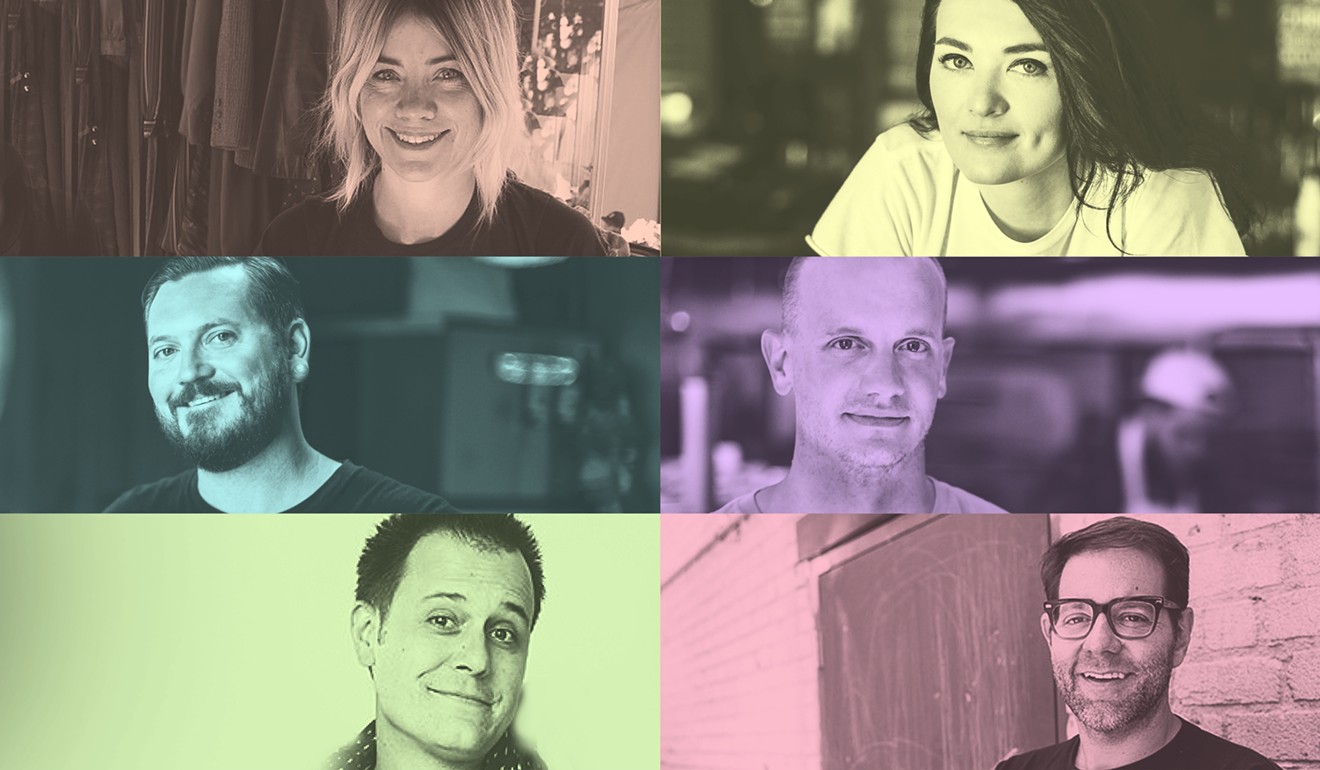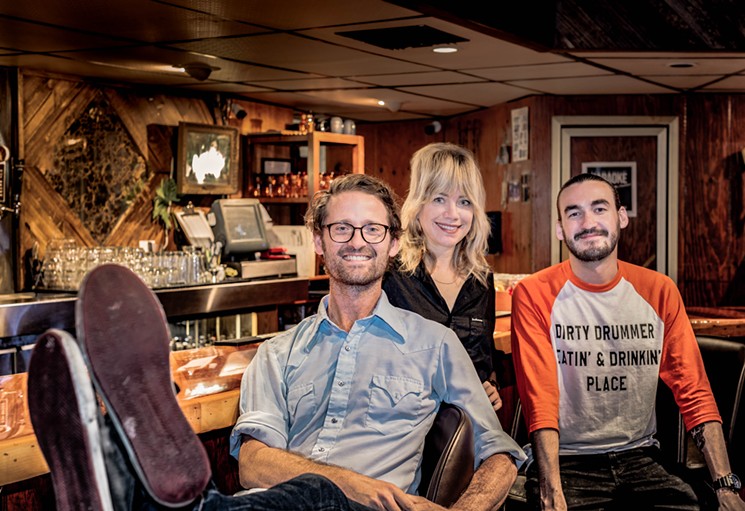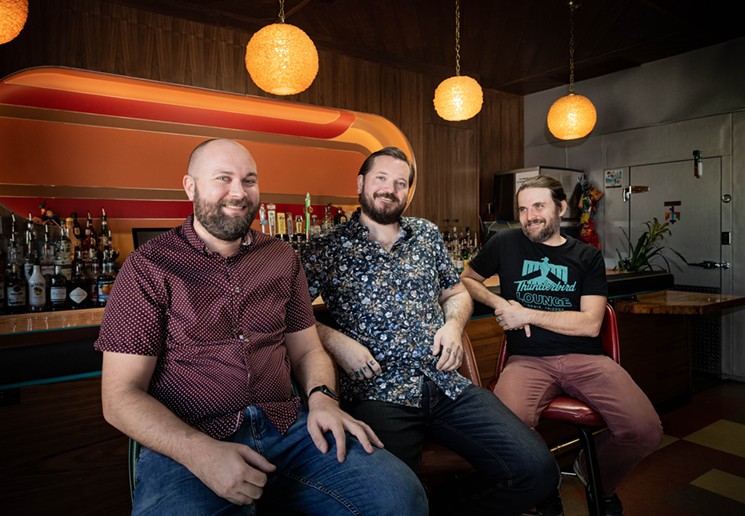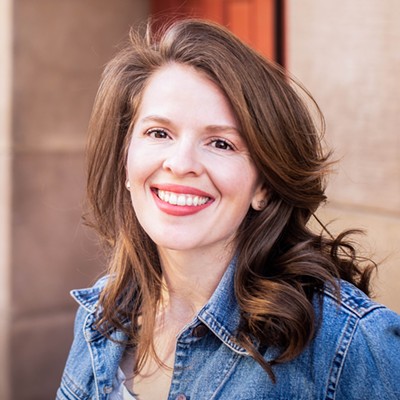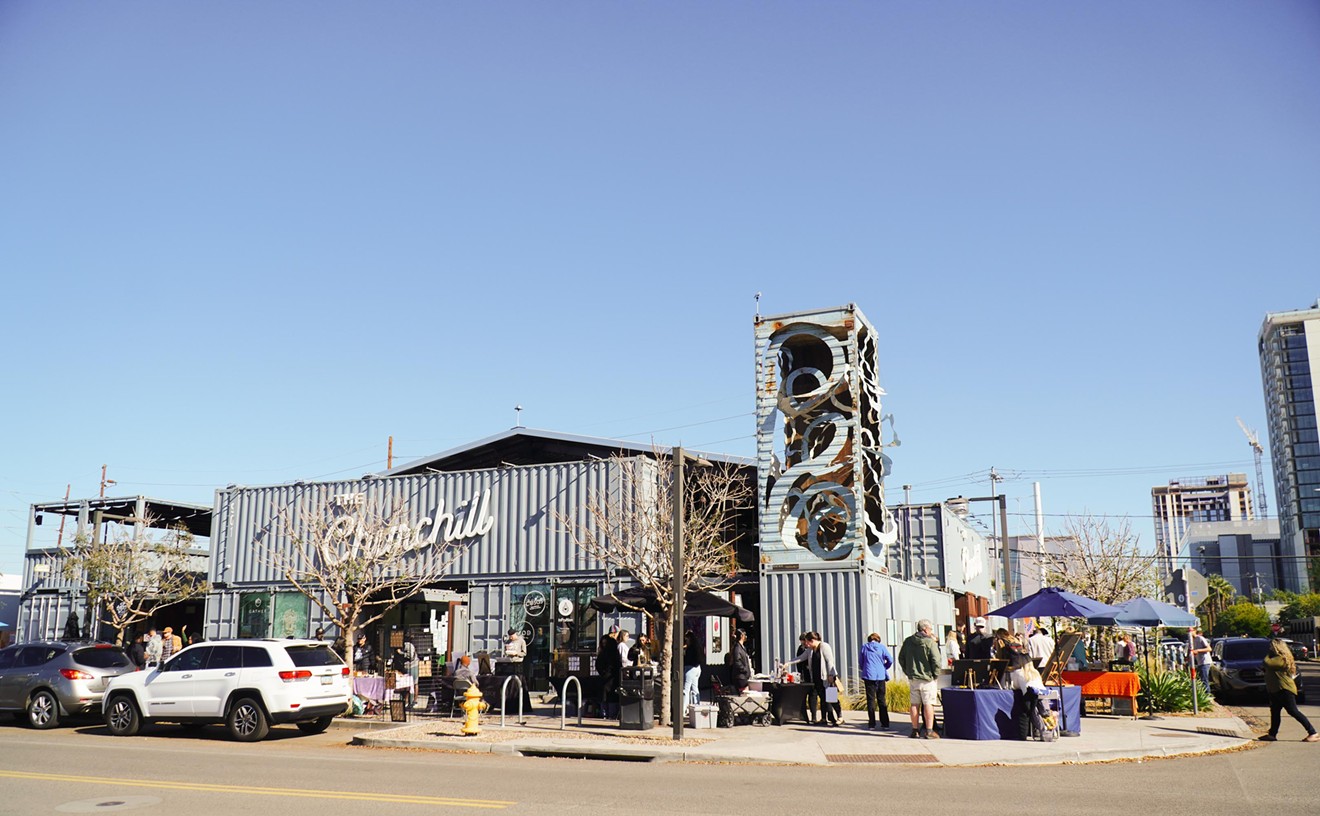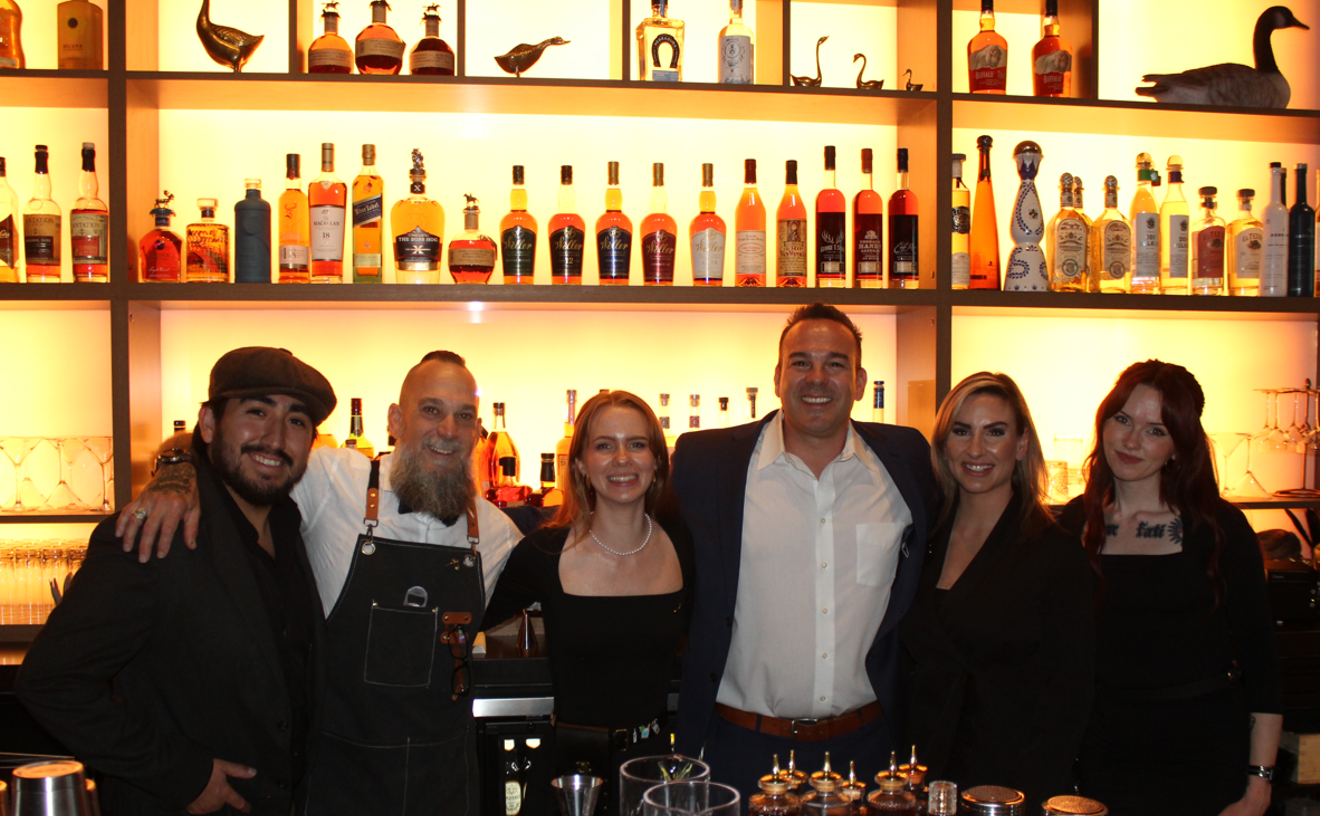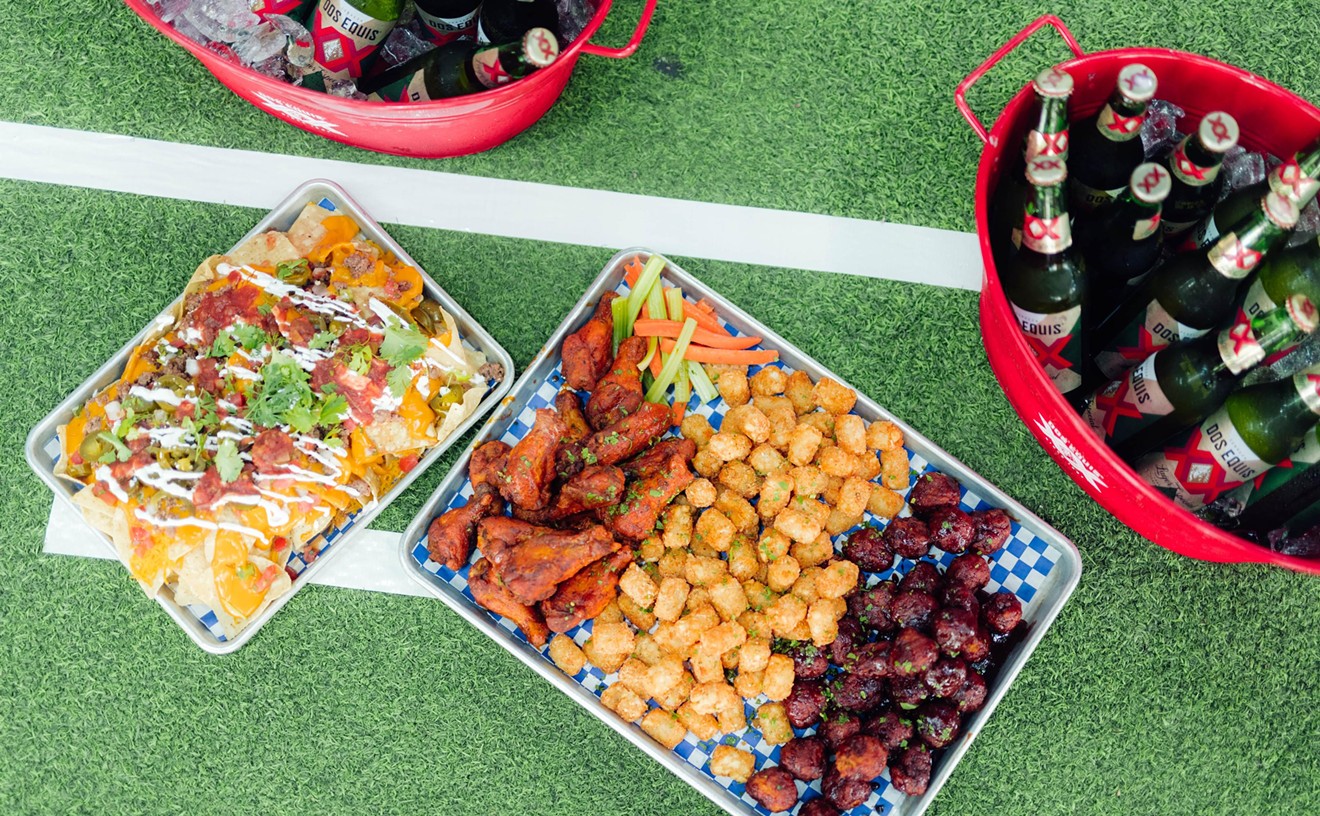We knew all the words to the Dear and the Headlights’ album Small Steps, Heavy Hooves, as many in the room did. I remember saying hello to band members after a show at The Clubhouse and geeking the fuck out like they were A-list celebrities. Later on, there were also a couple of drunk Sunday nights at Yucca Tap Room during the Valley Fever show, as a different group of friends were into rowdy country. But even though there was enough to do, Phoenix was lacking for many of us. We talked big about moving to Seattle, Boston, New York, or Portland, Oregon.
In these late-aught years, I was a student journalist at ASU. The timing was convenient, as I wanted mostly to write about local music, and the local music scene was going through something pretty special.
I met The Morning Kennedy Was Shot for an interview at Stray Cat Bar & Grill, later went with them on a van trip to play a show in Flagstaff (or was it Prescott?). I remember being honored to review Dear and the Headlights’ follow-up album Drunk Like Bible Times. I remember eating pizza with Gospel Claws at Slices on Mill Avenue after a Q&A.
Now, the bottom of the screen reads “Present Day,” and I’m the food editor at Phoenix New Times. And somehow, I’m reporting on some of the same people more than a decade later. Because many of Phoenix’s current and former musicians, as well as local show promoters, have become restaurateurs, concept developers, and bar runners.
In 2019 alone, a member of The Morning Kennedy Was Shot, Wayne Coats, started Instrumental Hospitality Group with some dudes from Dear and the Headlights. Developer Chuckie Duff, who was a bassist in that band, is about to open Track Club in the old DeSoto Central Market building. Show promoter Jeremiah Gratza, director of operations for Stateside Presents and manager of the President Gator record label, opened Thunderbird Lounge with some buds in April. Dana Armstrong, overseer of the Valley Fever country show, opened The Dirty Drummer Eatin’ & Drinkin’ Place 2.0 in May. These new businesses were predated slightly by Grace Perry, former singer of Landmine Marathon and current owner of Gracie’s Tax Bar, which opened in 2017.
But a model for all may be Charlie Levy. I remember hearing his name in high school from shows at the old Nita’s Hideaway. He left Phoenix for a while, but returned in 2011 only to open the prime example of this phenomenon, Crescent Ballroom — followed by Valley Bar and The Van Buren.
So, what the hell is going on? Not complaining, as this trend is exciting for us older showgoers who recognize most of these names, remember seeing these people on a stage somewhere more than 10 years ago. But why is this transformation happening now? Why is it happening here?
The answer is pretty sweet.
These musicians turned business owners all thank others — Chuckie Duff, Charlie Levy, even Chris Bianco — as well as supportive communities. Though competitors, they are quick to refer other bars and to say they were inspired by each other. What’s more, most of them already had experience in the food and beverage world, having worked in the restaurant business between tours. And to put it simply, musicians are artistic, cool kids, so it makes sense for them to open cool places.
The success of these businesses is multi-pronged: supportive colleagues and communities, developers who get it, restaurant world experience, and creative people forming alternative and welcoming spaces.
But you don’t want to just hear it from me.
Dana Armstrong
The Dirty Drummer/Valley Fever2303 North 44th Street
The sports bar and luncheonette at 44th and Oak streets was opened in 1975 by Frank “Drummer” Armstrong and his partner, “Dirty Dave” Werner. Armstrong died in 2012, and the Dirty Drummer closed in 2018. However, the former owner’s daughter, Dana Armstrong, with business partners Andrew Smith and Tom Bernard, reopened the spot in May with a strong nod to the Drummer of yesteryear.
Armstrong’s background is also woven into the Valley’s music scene as the creator of Valley Fever. She started it in 2005 as a DJ, playing old country records on stage at her favorite bar, Yucca Tap Room. Her goal was to re-create the atmosphere of Gilley’s from 1980 or Mr. Lucky’s from 1978.
“The Yucca Tap Room ambiance resonated with me was because of growing up in the Dirty Drummer,” she says via email, explaining how Yucca has a timeless Arizona bar atmosphere that made her feel comfortable. Then, she started including bands.
The term “Arizona Country” was used to describe the community of local groups playing Valley Fever — which happened on Sunday nights for more than 10 years. Some special events included the 14-hour Quarantine show; honky-tonk Halloween contests; tribute shows for Merle Haggard, Hank Williams, and Willie Nelson; and the annual 6 a.m. Rooster Club show. Armstrong took the concept to other venues like Crescent Ballroom, Valley Bar, Handlebar J, and Spoke and Wheel, but now, it’s held at The Dirty Drummer.
Aside from being an additional stage for acts like Flathead and Tony Martinez, The Dirty Drummer is primarily a bar and restaurant. The menu lists Drummer burgers and wings, cooked or deep-fried on the grill just behind the bar. The house beer is Miller Lite. Bartenders make mean cocktails. And diners can enjoy their meals to selections from Armstrong’s carefully curated jukebox or playlist.
“All of the music, including the house music, is very important to me at the bar,” she says. “My dad and I didn’t always have the same views on everything political, but we did tend to have the same taste in music. In today’s political climate, I think the music that we’re bringing to the Drummer brings people together instead of dividing them apart. It helps people discover things they have in common instead of highlighting their differences.”
Armstrong’s experience with Valley Fever and musicians has seeped into how the Drummer operates today. She loves how other people like herself are turning into bar proprietors. “I like the idea of providing a place for people to have a good time and connect with each other,” she says.
One of her business partners, Tom Bernard, is a musician. He’s in Lowlands with his brother-in-law, Michael Krassner — a co-owner of Cibo. She says they are good examples of seeing the business from both sides and how it helps to have mutual respect between performers and business owners.
“Like live music, opening a restaurant is a project that takes patience, endurance, and a drive to create something of your own,” she says. “I’m proud of anyone who takes the risk.”
Jeremiah Gratza
Thunderbird Lounge/Stateside Presents/President Gator710 West Montecito Avenue
The three-member team behind Thunderbird Lounge — the popular Melrose District bar with a 1978 bachelor pad feel — certainly took that risk.
The team includes former Crescent Ballroom bar manager Brett Boyles and Jake Wiedmann of Hot Guy Band (who also managed tours for his cousin Jordin Sparks). Then, there’s Jeremiah Gratza, director of operations for the promotion company Stateside Presents (founded by Charlie Levy). He’s also manager of the President Gator record label.
And he used to book many of the bands mentioned in this story.
Asked why so many people from the Phoenix music scene are now opening bars and getting in the restaurant game, Gratza smiles. He’s usually smiling. “I think we all realize at the end of the day: What are people doing at concerts? People are just drinking,” he says.
But it’s more than that.
“You got to do things that keep you young and fresh and get you excited,” he says. “It’s really fun to see all these people that you’ve known for 20 years all doing something fun.”
Gratza also seems positive there will never be a real sense of competition among this group.
“Hopefully, we all just help each other,” he says. “Like, ‘Have a drink here. Go to Gracie’s. Have a drink there. Go to Dirty Drummer — just be a part of the community.’”
Thank God for Lyft drivers.
Thunderbird Lounge’s birth, however, does follow the theme. Gratza says he, Boyles, and Wiedmann took their model from Levy — opening a bar near where you live. For years, if they wanted to go out but stay close to home, it was either George & Dragon or Bonus Round. But, in his true fashion, Gratza stresses how those places are still fun.
“For us, we’ve been here for the birth of Crescent and the birth of Valley Bar, and we’ve seen that excitement and been a part of it,” he says, “and we wanted to do that for ourselves.”
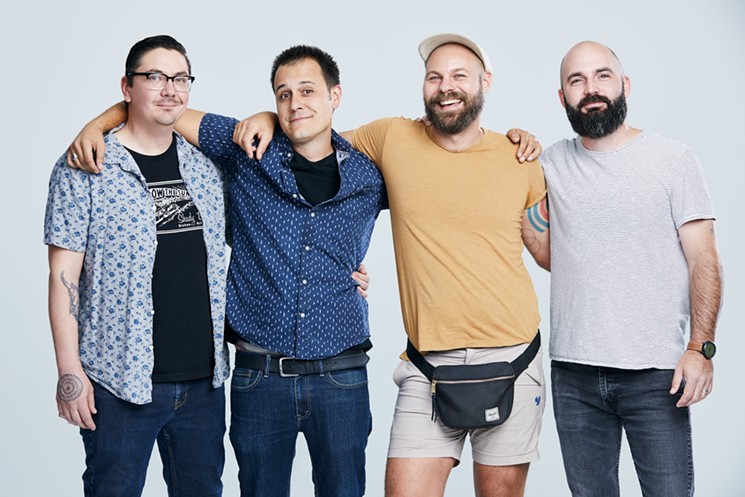
Left to right: Michael Babcock, Wayne Coats, Paul Waxman, and Robert Cissell of Instrumental Hospitality Group.
Matt Martian
Wayne Coats
Instrumental Hospitality/Belly4971 North Seventh Avenue
They seem to be seeking that same excitement at the newly formed Instrumental Hospitality Group. Michael Babcock and Wayne Coats amicably left Welcome Hospitality (Welcome Diner and Welcome Chicken + Donuts) in June 2019, partnering with Paul Waxman (formerly of Cobra Arcade Bar) and Robert Cissell (formerly of Gallo Blanco and Angry Crab Shack).
The pals just completed an overseas food tour — inspiration for Belly, a two-story Southeast Asian kitchen and cocktail bar they plan to open in spring 2020 at Seventh Avenue and Camelback Road. The 80-year-old auto garage will have a fast-casual eatery downstairs for lunch and dinner, while upstairs will house a full-service bar and patio.
Instrumental’s members, as the name implies, were in popular local bands. Coats was in Not Quite Bernadette, The Morning Kennedy Was Shot, and Coats & Villa. Waxman and Cissell were in Dear and the Headlights, and Babcock was in a couple of bands like Darkness Before Dawn and now SLWLY.
I asked Coats via phone what he thought of this current trend.
“I think it’s really freakin’ incredible,” he says with sincere enthusiasm. He says he’s noticed how people he grew up with are now seemingly “running the city.” He uses Steve Chilton, the man behind Psyko Steve Presents who runs The Rebel Lounge, as an example, as well as others.
Coats also highlights similarities between his life as a well-known musician circa 2007, and his life now with the restaurant group. “The treatment is kind of the same,” he says.
Back then, other musicians would hand him demos of their band to check out. Now, other restaurants will serve him dishes to try. He says he once felt honored being invited to a friend’s CD release show; now, he feels honored to be invited to a friend’s restaurant’s soft opening. “Back in the day, everyone was wearing band T-shirts. Now the shift has really been repping other restaurants and bars.”
Even naming Instrumental Hospitality Group felt like naming a band. The recent trip to Vietnam felt a lot like touring.
With Belly coming next year, Coats says they’re excited to be neighbors with Thunderbird Lounge. “I’m proud of that boy,” he says of owner Jeremiah Gratza. Coats remembers Gratza booking his old band Not Quite Bernadette for their first show at Modified around 2002 or 2003.
“But I think we owe so much to Chuckie,” he says, referring to developer Chuckie Duff. Instrumental partnered with Duff, who’ll be more on the production and finance side, for their upcoming projects. “But this is the same thing he was doing in 2007,” Coats says, remembering how Duff would help local bands with demos, getting on show bills, even band names. “So, hats off to Chuckie.”
Coats also mentioned Grace Perry, proprietor of Gracie’s Tax Bar. “After she opened [Gracie’s], we had a moment like, holy fucking shit,” he says. “It’s so special to grow up in Phoenix.”
Grace Perry
Gracie’s Tax Bar711 North Seventh Avenue
Grace Perry is perched on a stool against a sunny window at Songbird Coffee & Tea House in downtown Phoenix. She recommended this coffee shop, as it’s one of her favorite spots. She has a real passion for downtown.
“When you’re a musician, working in the food and beverage industry allows you to tour,” she says. “I would come home broke as all hell and need money, and the restaurant industry allowed me to come and go as I please.”
For seven years, Perry sang in local metal band Landmine Marathon. She was also in a girl punk band as a teen, among other things. In 2012, she left Landmine and got a public policy degree. Since then, she’s worked in executive operations for the downtown YMCA, for Pita Jungle, and Upward Projects. She was the food and beverage director for Crescent Ballroom, then Valley Bar. She also got married.
At some point, Perry says she turned to her new husband and said, “I want to open a bar.”
During her time at Crescent Ballroom and Valley Bar, which she refers to as “pretty much the most amazing job of all time,” she’d gotten to know Charlie Levy. “Charlie was like, ‘Why don’t you open a bar with me?’” she says, “and it kind of snowballed from there.” With Levy’s help, Perry opened Gracie’s Tax Bar in 2017.
Perry says she feels fortunate because, at the end of the day, she really just wanted to open a bar where she would want to hang out. However, now, she mostly leaves it in the hands of her dedicated staff as she focuses on other downtown endeavors, like working with Valley Youth Theatre.
Perry has come full circle, too, as she has employees who leave for tour, coming back to their jobs when they can. And she is happy to oblige. “I feel the food and beverage industry is just an open-arms environment,” she says. “I always felt more comfortable in the food and beverage industry than any other industry I’ve be a part of.”
Looking back, Perry says Levy pushed her in the right direction. He also introduced her to Chuckie Duff. “I feel like Chuckie has been such an incredible asset to people like me,” she says. “He’s going to hate me saying this, but I don’t care.”
She says many of these businesses wouldn’t have been given this opportunity if they’d had a corporate landlord or some type of huge developer. “I wouldn’t be able to do what I did if it wasn’t for Chuckie,” Perry says. “He’s not here to change Phoenix’s culture; he’s here to preserve it.”
Chuckie Duff
EQ Properties/Track Club915 North Central Avenue
Chuckie Duff waved me in from his underground office in downtown Phoenix, smiling as usual. It’s hard to describe his job title in one word. He’s mostly a developer, though sometimes a landlord. To put it simply, he’s in the business of buying and redeveloping buildings and spaces around Phoenix, then finding tenants.
On the music side, he’s plays bass in Palm Springs Eternal for fun. (Note: Another band member, Charles Barth, is the photographer for this story.) Duff was the bassist in Dear and the Headlights, so this meeting is exciting for me.
To recap Duff’s work, the majority of what his company, EQ Properties, does is in development — think Gallo Blanco, Ladera Taverna y Cocina, Gracie’s Tax Bar. He was involved in redeveloping the interior of the recently opened Ziggy’s Pizza. And Track Club — the biggest in scale of anything he’s ever done — is set to open in fall 2019.
Of his many business connections in Phoenix, Duff says it usually comes down to knowing people in the world of rock ’n’ roll. Friends from Phoenix’s music scene have wanted to help with projects, to work for him. And these are the people who have wanted to start their own businesses — namely, all these bars and restaurants. And these friends typically have experience in this field.
“The food and beverage industry is a good industry for a musician to be in,” he says. “It makes sense for creatives to build these spaces — bars and restaurants have become about the experience.”
And Duff doesn’t see this current trend slowing down.
“I think, from what I’ve seen in the market from the outside is, that Phoenix is still not oversaturated, yet,” he says, “and hopefully won’t be for a while.” Duff says the Valley has great population and economic growth. For restaurateurs and developers, people who are making something unique, they’ll succeed in Phoenix unless they don’t know how to run a business.
And he has an example. “There was nothing to do downtown, and now there’s a lot to do downtown, but I still don’t think we’re on par with something like a San Diego,” he says, “I believe there’s a lot of room left for this growth.”
The “a lot to do downtown” part is referring to Charlie Levy opening Crescent Ballroom earlier this decade, which kicked into gear an otherwise dormant central city. And like Duff said, it’s an experience, something unique.
“I have come to know that [Levy] really put a lot of thought and effort into the restaurant. The lounge and the food and the drinks is not an afterthought. It’s a great way for a venue to have longevity,” Duff says. In fact, Track Club will have something of a lounge in the old DeSoto Central Market building, where people can eat and drink without entering the nightclub like the setup at Crescent Ballroom.
“For me, that was the inspiration, and the adaptive reuse part,” he says. “I think Crescent absolutely paved the way for everything to follow.”
Charlie Levy
Crescent Ballroom, Valley Bar, The Van Buren/Stateside Presents308 North Second Avenue
Charlie Levy is seated behind a large order of chips and salsa in Crescent Ballroom’s restaurant and lounge, Cocina 10. I told him I was a fan of the chips here, so he had some waiting for our talk — which speaks to the type of person he is.
As you’ve certainly come to know by now, Levy is the man behind Crescent, as well as Valley Bar and The Van Buren. These three take up his day-to-day. Before, Levy was known for promoting shows, getting his start at Nita’s Hideaway and establishing Stateside Presents. He also worked in Tucson for a bit with Rialto Theatre. Then, in 2011, he moved back to Phoenix to start Crescent Ballroom.
But it seems like Crescent was kicking around in his head for a while. Just from being around shows so much, he says he noticed how people wanted to combine eating and drinking with live music.
He says at Nita’s, people would come right before the show and leave right after. When he would go to the Mason Jar, now the Rebel Lounge, people would go to a nearby bar and run back in right before the show.
He remembers what he saw at the famous old Mill Avenue music venue Long Wong’s. “People would hang out on the patio, eat and drink, and then go to the show, and then go back,” he says.
He wanted that culture where people and musicians were hanging out. Food, drinks, and music became one entity. “And so, I was always thinking about it,” he says. “When I ever owned my own venue, it would be part venue, part lounge, bar, tavern, with a food component, for all those reasons.”
There may or may not be a show happening in the stage room at Crescent, but the lounge, patio, and balcony are always open, free, and serving food till midnight. Levy believes if you need to pay a cover just to enter the building, it loses a sense of community, even energy.
Cocina 10’s menu was crafted by Pizzeria Bianco’s Chris Bianco, as well as Otro Café’s and Gallo Blanco’s Doug Robson. Even Chef Claudio Urciuoli of Pa’La was in the Crescent kitchen for some time. But Bianco and Levy go way back to the Nita’s days, when Bianco would close the pizzeria and head out to Tempe to catch shows.
Bianco “just completely offered” to create Crescent’s food concept — which Levy is excited to share.
The renowned chef painted a scene like this: Bands are coming down I-10 and pulling off to grab some Arizona road food. Music acts are either performing at the venue, or just visiting. But either way, leaving with a bag of burritos rolled up in foil, getting back in the I-10 for L.A. or Tucson.
As a result, Cocina 10’s menu consists of Arizona staples like tacos, Sonoran dogs, I-10 nachos, and foil-wrapped burritos. And each burrito is marked with its own special sticker, including Mr. Bean and Morrissey.
“Of anything I’ve ever done, I’m most proud of the kitchen here at Crescent,” Levy says. “Because it’s challenging and it’s hard, and we have great people that work here every day.
“We’re not on the Food Network, but we have a wait for lunch today. I’m super proud of it.”
Levy’s not lying. Two dudes in business casual at the entrance are waiting patiently to be seated. Levy says he’ll see people like Stephen Jones, the chef at the Larder + the Delta, come in a get a bean-and-cheese burrito. “That’s the true test,” he says. (About 10 minutes later, Levy, in a hushed voice, tells me to turn around. Chef Jones has just walked into Crescent for lunch. Both our mouths fall open at the coincidence.)
Levy also stresses the help he got from Tucker Woodbury, a Crescent partner and head of Genuine Concepts. They met working shows at old Rockin’ Horse music venue in Scottsdale. “He guided me through the entire development process and set up the entire bar systems,” Levy says.
His lack of ostentation resonates with what I’ve heard about Levy from so many others for this story. Though others cite Levy as an inspiration for their businesses, even he feels indebted to others.
“Look at Chris Bianco. Look what he did for me,” Levy says. “If he didn’t come in and go, ‘I love music, I want to support you and support the music scene so Phoenix has a quality venue for bands to perform in,’ I don’t know if Crescent would be Crescent the way it is, or if we even would have made it.”
Levy certainly subscribes to the supportive theme that is central to this whole story.
“I feel, in Phoenix, the music community has always been very friendly and supportive. But we’re like, competitors, right?” he says. He explains how he’s friends with Steve Chilton, who took over the Rebel Lounge. Chilton is technically a competitor, but the two have vacationed in China together, and just got back from Mexico.
Levy then drops into a heartfelt stream of consciousness about this current movement of old Phoenix musicians opening what may one day become old Valley haunts.
“We’re such a close-knit, friendly community and everyone is helping everyone because it’s not this crazy competition — this mean-spiritedness that might be in other cities,” he says.
There’s no doubt he’s being earnest.
“Everyone is so friendly, and people who are in bands are so talented. They’re creative, and a lot of them work in restaurants and bars,” he says. “So, it’s like, what better people to have their own concepts?”
I left my talk with Levy in a completely elated state. Driving away in the bright sun in my hot car, passing so many new places that have popped up in downtown. The local food and drink scene is going through quite a renaissance right now.
Old Valley garages are being turned into community spaces, where we’ll all be making memories if we haven’t already. It’s an exciting time to be exploring this city, much more so than 2007. I’m just glad many of us, especially those I talked to for this story, didn’t head off for Seattle, Boston, New York, or Portland.
They stuck around Phoenix to make this happen. It’s pretty special.
Editor’s note: This article was updated from its original version.

